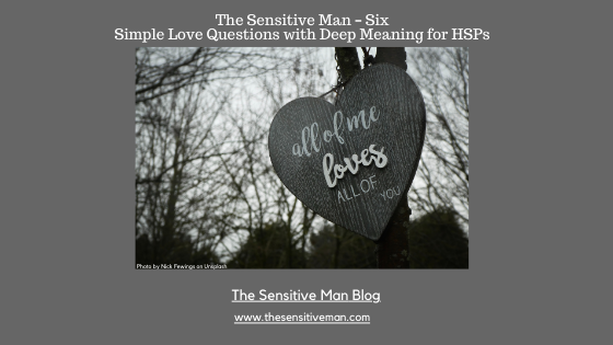|
A Blog about Sensory Processing Sensitivity from the Worldview of a High Sensing Male Oh, how I wish there were a simple, logical, algorithmic formula to discern who we are most compatible with in matters of love. The little heuristic would be a goldmine proposition if it were reliable, valid, and portable. HSPs especially need assistance because we often are too trusting and too empathetic to be objective in finding the perfect match. It's hard to get to the core values of a person, know their heart, and trust they are right in a short time, leading to a deeper emotional commitment. Dating site bios are virtually worthless, as most people (and, yes, I've done this too) pad their life story to make them seem better than they are. Let's face it; it's a marketing ploy we all use. Because HSPs are tenderhearted people and often naïve about love, we are easily duped by potential amours that ultimately don't understand us or use and manipulate us. Although there is now a measure of the Capacity to Love, it is not something you would or should filter through every future date. Yet, the truth is there is no foolproof bullshit detector in love that you can carry like a Geiger counter to detect radioactivity in a potential partner. However, I have found that by creating my personal red flag questionnaire, I can at least hold the love interest through the light of my internal prism and get some measure of whether we might be compatible companions. This list is not comprehensive but might serve as a starting point in considering someone new. You can add to these or craft them more to your individual experience and liking. Question #1 – Can the person you are interested in say, "I'm sorry." (Emotional Maturity) Admitting guilt when making mistakes is a "big" adult thing. It signifies emotional maturity and signals that a person is willing to accept fault to patch up a disagreement. Psychologist Rick Hanson suggests that admitting fault cuts through the ego gesturing, reducing stress and anxiety, allowing moving on to other matters, and showing a commitment to being mindful of the mistake and a willingness to correct it. This critical gesture is essential in relationships, especially for HSPs. We HSPs often take the lead in apologizing for our mistakes in arguments or disagreements. It is a gesture of goodwill and a willingness to bring to an end a messy emotional situation. However, if we are in relationships with others less forthright about guilt admission, this could signal problems later on down the road. The idea of being held hostage to a disagreement means to an immature other that you don't love them and may lead to devaluation of you in their eyes. This situation shapes a conditional love that for HSPs causes us to devalue ourselves. This often leads to gaslighting, shaking confidence in oneself, and doubting the other's love of you. Emotional maturity is vital here. What you are looking for is someone who takes responsibility for their actions. They must have the humility to admit when they are wrong, willingness and commitment to find compromise when needed, be supportive emotionally, controlling their impulses, and being trustworthy. When you find a person who can readily admit they are sorry in a heated disagreement, you have found someone displaying the earmarks for emotional maturity. This is a good indicator that this is someone that holds promise. Question #2 – Do your political beliefs align? (Self-ideology or Identity Manifestation) A political question may seem to be a lethal question to ask a potential partner in today's bifurcated and polarized political landscape. But, here are a few points to consider when asking about political views:
Naively, I think HSPs believe that something like political beliefs can be gently shaped and aligned with their own opinions or achieve a compromise with love and understanding. But viewed through a hardened political lens, feelings can be affected. The deeper you go in the relationship, difficulties arise, not just on political matters but also on the emotional reasons these view attachments have. Political beliefs get to the heart of core values, and for HSPs, core value alignment is a key to relationship success. This simple question almost always runs deep and possesses key indicators about a person's personality and emotional status. It is easier to reach a compromise with an open-minded individual if you hear can each other. But beware of the close-minded political hack. Question #3 – Do your spiritual or religious beliefs align? (Deep Self-Identity) For many people, this may be negotiable, and it mostly depends on how deeply entrenched and affixed you both are to your spiritual/religious beliefs. It may depend on the degree to which each partner is open-minded to the idea that there are no absolutes regarding spirituality. You can imagine an Evangelical Christian dating a hard-core atheist or an eclectic New Ager dating a scientific materialist who sees spirituality as foolish and a waste of time. You can easily see where the problems will materialize. Since spiritual beliefs or lack of spiritual beliefs sit deeply within us, this is important in relationships. It often depends on where you are in life and whether this may cause issues, such as raising kids, ideas of morality, afterlife beliefs, etc. Many people have experienced profound and successful relationships with others who have different spiritual views, and for some, this does not rate highly in mate selection. Nevertheless, the spirituality perspective may affect how a person's morality plays out. It may indicate deep beliefs that shape how one treats others, what love means and who one can love. It also reflects how close-minded or open-minded a person can be. Be mindful that compromise is a part of every relationship, and you have to ask yourself how much you have to compromise on spiritual matters that may affect you. One religion or spiritual view might be incompatible with another, so stay open-minded, but remember there is more to this than just the affiliation to a belief. Question #4 – What is their relationship with their parents and primarily with their mother? (Foundational Emotional Matters) To me, this is a fundamental question. Why? Very simply, our parents are the first adults we bond with in life. They are the first people to teach us about love, caring, and nurturing. They are our first template for love, especially the mother. Often, I have found that prospective partners with complicated or non-active relationships with their mothers (and fathers) often have difficulty in love as adults. Without that early critical bonding experience, they are less likely to grow up to be happy, loving, and resilient adults. They may also grow up to have emotional problems that will naturally affect the outcome in adult love relationships. By understanding your potential partners' current relationship with their parents, you are getting insight into how they may form love bonds with others. If the connection is good with the parents, chances are excellent these individuals are well adjusted and capable of giving and receiving love. If the parents are cold, distant, controlling, and unaffectionate, this will have affected your amour on views of what love looks like, feels like, and acts like. Granted that relationships change over time and that sometimes fallings-out occur later in life between parents and children. Life circumstances may alter these relationships as well. The germ of this seed is in the early formative years with parent and child. This early time is the critical bonding period and generally shapes the parent-child relationship for life. All of this should manifest in how affectionate, how expressive in love a person displays. If they acknowledge you and are willing to show and give love, it should be something that surfaces early in your relationship with them. A person who lacks these qualities may be a person you might want to bypass. Put down your therapist hat and move on. You likely will not be able to fix their problem. Question #5 – Do they listen to you? (Interactive Measure and Empathy) Being heard is very important to HSPs. Whether you are an extrovert or an introvert, it doesn't matter; at some point in your relationship, you will want to talk and be heard. And be acknowledged. Some relationships are identified by monologues and some by dialogues, but in the end, we all want to be heard, and the latter type of relationship is where we want to be. Does your love interest hear what you have to say? Do they actively listen to you, i.e., a conscious decision to listen to what you are saying? It seems we either listen to understand or listen to respond. Listening to understand is a deeper type of listening; it is more receptive and compassionate. Listening to respond implies a need to engage in criticism and be motivated by a need to correct you or fix you. One embraces, the other repels. One is deep; the other is shallow. HSPs seek meaning in just about everything, including relationships. It would be a natural desire for HSPs to form deep relationships, and the foundation for this is listening. If they are doing all the talking, well, you are not being heard. Empathy in part comes from communication. We are naturally good listeners. We need good listeners as partners. It is not a one-way street. Question #6 – Are they socially adaptable? (You, Me, and the World) Watch how your potential partner interacts with others. HSPs can be very chameleon-like when we interact in social settings. We are so tuned in to the environment; I think either for comfort or reconnaissance reasons, we adapt to our settings. Maybe it's a comfort thing, or perhaps it's to make others comfortable and make us relatable to them. We can shapeshift if needed. Looking for a partner that can do similarly, although maybe not critical to all HSPs, is crucial to me. I like to mix with mixed crowds and am not comfortable suffering partners that are snobs or find looking down at others as great sport. I try to stay humble with socializing and blend in and engage strategically and sometimes tactically. In networking for business, I like to seek out and find individuals with mutually beneficial contact. For pleasure, I tend to meet people strategically, basically learning from the new encounters with no specific goal in mind. With that said, I would prefer my partner, be able to do the same. How people treat others says a lot about how they will treat you. Look for kind, humble, and socially adaptable people. Granted, this is a simple reflection of how to gauge potential love interests. Your experience may frame similar or completely different questions. The point is to formulate what is essential for you in a partner. Each of us will have our own criteria, but we must know what these points are for each of us. And be astute observers. I recommend you read Dr. Elaine Aron's book on love and HSPs. You will learn a lot about the needs and interactions between HSPs and HSPs, HSPs and non-HSPs, and all combinations in between. There is excellent research (both her and her husband, Arthur) and real-world information in them. Good luck with your love search, be careful, be cautious, and, especially be particular.. You won't regret it. Please share your thoughts in the comment section.
0 Comments
Leave a Reply. |
AuthorBill Allen currently lives in Bend, Oregon. He is a certified hypnotist and brain training coach at BrainPilots.com. He believes that male sensitivity is not so rare, but it can be confounding for most males living in a culture of masculine insensitivity which teaches boys and men to disconnect from their feelings and emotions. His intent is to use this blog to chronicle his personal journey and share with others. Archives
July 2024
Categories
All
|



 RSS Feed
RSS Feed
